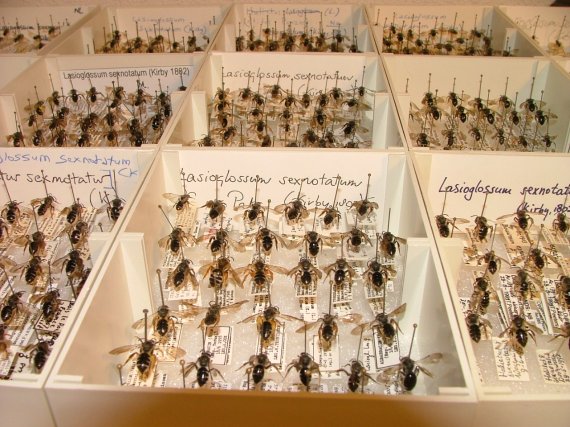The Dutch countryside has changed radically since the mid-twentieth century. Increasingly intensive farming has left its mark. In the space of 100 years, the amount of land providing a typical bee habitat has shrunk by 80 percent. So it would seem probable that a shortage of food could affect the 357 (!) known species of wild bees in the country. PhD candidate Jeroen Scheper has now proven this in an ingenious fashion.
For his investigations, biologist Scheper delved into the natural history museums. There he scraped some pollen off the bodies of every mounted wild bee he could find. And by analysing the pollen he could find out what their favourite food was. ‘The assumption here is that before 1950 the menu was still full of options,’ explains Scheper. ‘And that there was no shortage of suitable food yet in those days.’ Scheper spent months, spread over a couple of years, poring over the collections in Leiden, Amsterdam, Wageningen, Leeuwarden, Rotterdam, Tilburg and Brussels. The preferred diet of most bees became less and less available in the second half of the twentieth century. Scheper correlated that with the degree of decline in the bee populations. The link between the two was crystal clear. The shortages of foodstuffs explain almost half the changes in the numbers of bees of a given species. Scheper: ‘For this kind of study, that is a surprisingly large proportion. It is great that this has come out of the study like that.’
Size
The study shows that the bees that have had the hardest time forage on Leguminosae such as clovers. Bees that head for species from the Rosacea family (apple, strawberry, pear, plum), by contrast, have increased in numbers. ‘That is good news, in principle, because it means we don’t have to start worrying about the pollination of the crops in that family.’ Apart from the menu, the size of the bee seems to play a role too. The bigger the bee, the stronger the decline in the population, probably because a larger bee needs more food. Knowledge about the ideal menu of bees provides a basis for taking measures. By planting purposefully, you can make life easier for species that are under pressure. It is also important, thinks Scheper, to make sure there is enough food throughout the season

